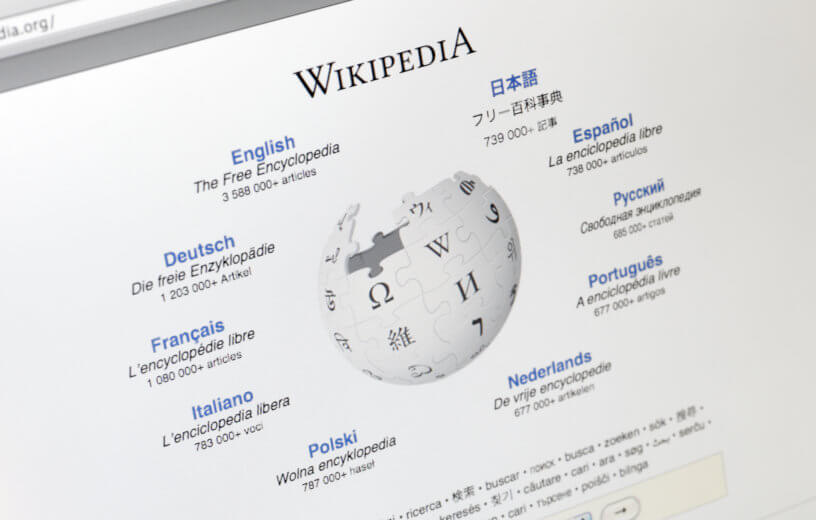BARCELONA, Spain — For over two decades, Wikipedia has served as a go-to source of information for countless people. Serving as the internet’s free-to-use encyclopedia, it isn’t a stretch to say Wikipedia has changed how people create, gather, share, and learn new information. However, researchers from the University of Barcelona point to a number of glaring defects when it comes to its decentralization and flexibility. More specifically, study authors say there is a gender gap on Wikipedia when it comes to inclusion and diversity.
Researchers explain these gender biases become undeniable when they examine Wikipedia’s content and editorial participation rates. The online encyclopedia features a much lower percentage of female biographies and an unequal representation in editing to boot. Moreover, there are clear gender representation gaps regarding content, biases in editing and participation, and imbalances in readership.
These conclusions come from a bibliographic analysis of Wikipedia spanning 2007 to 2022. The study was put together by Núria Ferran and Juan José Boté, lecturers at the Faculty of Information and Audiovisual Media of the University of Barcelona, in collaboration with Julià Minguillon, lecturer of Computer Science, Multimedia and Telecommunications at the Universitat Oberta de Catalunya (UOC).
Importantly, this initiative was also part of the Women and Wikipedia: Analysis of the Gender Gap in the Co-Production of Knowledge in the Wikipedias of Spain (W&W) project, and received funding from the I&D&R National plan of the Spanish Ministry of Science, Innovation and Universities and the Spanish State Research Agency (AEI).

Núria Ferran, the study’s principal researcher, notes there are three lines of work identified by researchers that may explain the observed gender gap on Wikipedia.
“We called one of the lines ‘women’s problem’, in which the stereotypical characteristics of women are blamed when it comes to participating in the public sphere. The other line is ‘the mirror effect’, in which Wikipedia is blamed for the gap, as it simply reflects the existing bias in society due to its principle of encouraging all content in external information funds. And finally, with the position we identify with in our project, there is the systemic problem line, identified by Heather Ford and Judith Wajcman, in which they blame the original community, rooted in the encyclopedic and open culture, which may hide an exclusionary practice,” Ferran says in a media release.
The descriptive analysis employed by the study examined the authorship of the articles, the involved academic disciplines, any institutional affiliations, as well as the location of the research staff involved in the studies. Researchers also analyzed the approach of each Wikipedia article, analyzing chronologically the production of the documents. This careful process of content analysis revealed academic findings across three main areas: gender bias in content, in edition and contribution, and in the number of readers.
All in all, study authors say their work provides a detailed view of the gender gap on Wikipedia and highlights the urgent need to address the problem in order to foster a more equal and diverse platform. They present a number of strategies intended to tackle the problem, with a special emphasis being placed on improving the visibility of women editors, promoting constructive comments, and creating a more inclusive community in general.
“The solution is found by approaching the phenomenon as a systemic problem. Therefore, we need to bring long-term strategic solutions. We need to diversify contributions and admit that the hierarchical collaborative model on Wikipedia reinforces the dominant voices, leaving out the non-dominant ones,” Ferran concludes.
“If Wikipedia does not change its culture of knowledge of co-production, women and other minority groups will remain on the margin. Therefore, the aim is not only to reduce the bias by increasing content on women, but also making Wikipedia a more robust, reliable and transparent platform to co-produce knowledge. This holistic approach is essential for a lasting change.”
The study is published in the journal El Profesional de la información.
You might also be interested in:

Drivel. This a study that is looking for a problem where there is not one.
If it was left for participants to contribute then it reflects them and their interests. There was no anti-female scheme, just contributions by interested persons. There are no overall sexist and racist schemes operating.
Its not a problem— it’s reality. There are more interesting men than women
The reality is that men have contributed 10x as much (at least) to every sphere of human endeavour as women.
The reality is that whites have contributed 10x as much to the current western social order as blacks and asians.
You may not like those facts but that does not change them.
The African societies are ‘rich’ (beneficial) in many ways, and superior to western society in cohesion and caring, but they do not provide systems which lead to Wikipedia.
In a high school athletics championship, 13 boys ran 1,600 metres faster than the women’s world record. You don’t have to like it, you just have to acknowledge it.
Sounds like you are trying to push your own reality and meaning on to history without any real analysis – probably because you are a white male.
Most of the time when there are articles that mention anything to do with race or gender trolls descend on it without any analytic or experimental data to assure each other their higher status remains intact. Of course they never admit that while they think white males have contributed the most or are the best in every category – what their own contribution to that has been. Usually nothing.
So you troll people who actually write the truth as it does not fit with your warped ‘reality’.
My own contribution has been significant although not in science or athletics. Thus it does not make the headlines.
However I spent a lifetime lifting people and performance up, not denigrating and denying.
If you have any facts or data to add to the discussion please do so, slagging off others is the action of a poor, weak, failed human being.